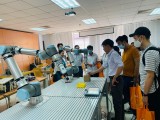To cultivate a digital workforce
In recent years, vocational colleges and universities in the province have innovated teaching and learning methods by focusing on investment, procurement of modern machines, and setting up laboratories and fablabs to help students access advanced technologies. This training method is suitable with reality, catches up with the development of science and technology, contributes to creating high-quality human resources.

Students of Vietnam - Singapore Vocational College practice in Fablab, which is equipped with modern machines.
Effectiveness from Fablabs
For a long time, Vietnam - Singapore Vocational College has become a reliable place for students inside and outside the province to study. More than 90% of graduates are able to satisfy job requirements of modern factories from Europe, Japan, and Korea. Recently, this college continued to invest in a Fablab with a total cost of more than 10 billion VND for students to practice and improve their skills. This Fablab includes all kinds of modern machines, such as punching machines, CNC lathes, copper wire cutting machines, multi-purpose cutters, automatic conveyor models etc. to meet teaching and learning requirements at college and of those wishing to come here and practice. This Fablab is one project under the Triple Helix model to improve the quality of education and training, enhance scientific and technological research and development activities, and raise entrepreneurship and creativity, space to experiment with technology and manufacturing among young people.
The investment in Fablab has opened up many opportunities for students' apprenticeship. Nguyen Thanh Dung, student of C18CK1 class, said: “Machines that have just been invested in this Fablab are very modern, I have never seen them and have never had a chance to practice on these machines before. After theory learning combined with regular practice on modern machines, on graduation day, we will have a fairly good fund of knowledge, not be surprised when working with modern technological lines".
Many teachers at the school assessed that having a Fablab equipped with modern machines for students to practice after theory lessons would open up good opportunities for students. This Fablab can not compete with modern machines in Europe but not be inferior to countries in Southeast Asia. The school management board also hopes that in the coming time, governmental branches and levels would create favorable conditions for more laboratories like this to be opened in the province, then students would be skillful after graduation and have a high chance of getting a good job.
Some other vocational training institutions in the area, such as Dong An Vocational College, Vietnam - Korea College, are also aiming to improve students' skills. Le Quang Son, Head of Mechanical Engineering Faculty of Dong An Vocational College, said that each year the college has about 2,000 graduates that are qualified to meet job requirements in provincial industrial zones. In addition to regularly investing in modern laboratory equipment, qualifications of teachers are also put on top. Currently, this college staff includes 80% lecturers with master's and doctoral degrees. Their teaching method is not focusing too much on theory as before, but mainly creating chances for students to practice more on machines, promote students' creativity. Another important thing that cannot be ignored is that depending on the functions of each faculty in the college, teachers must go on field trips, approach new technologies and machines in factories, then make reports to the college. Field trips of teachers in companies also form a channel to connect and create jobs for students after graduation.
Community connection
Talking about the role of the Fablab, Tran Hung Phong, Rector of Vietnam - Singapore Vocational College, said that besides meeting of teaching and learning requirements, the Fablab room was like a small workshop that focuses on digital manipulation, a space where individuals can develop their core competencies, do whatever they want; show their personalities and creativity, a place where people can meet, share knowledge or exchange ideas together about projects, thereby fostering innovation in the community of tech enthusiasts. Fablab's activities also contribute to boosting research and innovation activities among students, universities, colleges and vocational schools, linking research with reality; providing free workspaces for all in the community by facilitating the use of necessary machinery and equipment.
Nguyen Viet Long, Acting Director of provincial Department of Science and Technology, Director of Binh Duong Smart City Office, said that currently programs to promote innovation and science technology research, modern education such as STEM / STEAM, provincial innovation center, TechLabs, Fablabs, and business incubators have been actively and vigorously expanded from the government as well as educational training institutes, schools and enterprises.
From the smart city strategy, the province has gradually cooperated, attracted leading corporations in science and technology, such as Schneider Group, Philips, Bosch, NXP, Intel, and TMA. Famous domestic and international institutes and schools such as Singapore National University NUS, Taiwan Industrial Research Institute ITRI, Korea Chungnam National University, US Portland State University, Ho Chi Minh City National University, Institute of Mechanics and Applied Informatics - Vietnam Academy of Science and Technology, thereby building large-scale research, innovation and training centers. Binh Duong's potential, desire for innovation and strategic vision towards the 4.0 era have helped expand connectivity and cooperation with many prosperous provinces and cities around the world, such as Eindhoven and Emmen (Netherlands), Emilia Romagna (Italy), Daejeon (Korea), Yamaguchi (Japan)...
To develop and attract human resources in the new stage, the province is developing education - training digital skills on all education levels; to integrate STEM and STEAM education into educational training programs, to encourage creativity of the young generation, early prepare digital workforce and innovate for the future. Universities and colleges will continue to play a very important role to meet the above requirement. Under the direction of provincial leaders, the government will continue to facilitate, invest and encourage educational institutes to strengthen international cooperation, deepen linkages with enterprises and institutes and schools around the world, to learn and exchange experience, develop advanced research and training programs, develop online learning - smart training, catch up with trends of the current time.
Reported by Quang Tam - Translated by Ngoc Huynh
 Binh An Ward launches "Digital Family" program
Binh An Ward launches "Digital Family" program
 Bau Bang launches the Intelligent Monitoring and Operation Center (IOC)
Bau Bang launches the Intelligent Monitoring and Operation Center (IOC)
 Vibrant activities from grassroots level
Vibrant activities from grassroots level
Binh Duong is an active and responsible member of ICF
 Binh Duong aims at building a smart, green and sustainable city
Binh Duong aims at building a smart, green and sustainable city
 Building up an innovation ecosystem at new era’s demands
Building up an innovation ecosystem at new era’s demands
 Abundant activities in response to National Digital Transformation Day
Abundant activities in response to National Digital Transformation Day
 Beca Smart City - The foundation of a Smart City
Beca Smart City - The foundation of a Smart City
 Digital transformation supports social welfare
Digital transformation supports social welfare
 PM requires full legal corridor to promote national digital transformation
PM requires full legal corridor to promote national digital transformation



